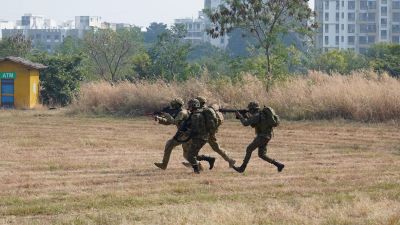Freeze on petroleum price deals IOC Rs 2,143 cr loss
Indian Oil Corporation on Tuesday said the company has suffered a loss to the tune of Rs 2,143 crore in the first quarter of the current fis...

Indian Oil Corporation on Tuesday said the company has suffered a loss to the tune of Rs 2,143 crore in the first quarter of the current fiscal due to the government’s bar on raising prices of cooking gas and auto fuel.
At a press conference, IOC Chairman M.S. Ramachandran said the ‘‘price increase (of petroleum products) is necessary. Without price rise, operations are not sustainable.’’ IOC lost Rs 504 crore on unchanged petrol and diesel prices and Rs 1,639 crore on LPG and kerosene between April 1 and June 15. The company’s net profit fell 16 pc to Rs 1,849.94 crore in the fourth quarter ended March 31 and profitability would be substantially hit if the prices were not raised, he said.
When asked why the company could not take the hit when its net profit has touched Rs 7,005 crore in 2003-04, Ramachandran said ‘‘if you want the company to run on commercial terms you cannot force it to incur losses like this. Do you want this company to suffer a loss?’’, he asked. However, he clarified that ‘‘IOC would not end up making losses (in the first quarter of 2004-05), despite the hit, mainly because gross refinery margins were good at $5.6 a barrel. But profitability would be very badly eroded as the retail arm was selling products at prices lower than the rate at which they procure products from refineries,’’ he said.
|
IOC’s 2003-04 net up 15 pc
|
|||||
|
• NEW DELHI: For the fiscal 2003-04, IOC net profit was up 14.5 per cent to Rs 7004.28 crore compared with Rs 6,114.89 crore in the previous year. Sales increased 7.17 per cent, from Rs 110,589.14 crore in 2002-03 to Rs 118,522.74 crore. The total dividend for the year by the company worked out to 210 per cent as against 193 per cent in 2002-03. The dividend also included an interim dividend of 50 per cent, which was paid by the company in December 2003. —ENS |
|||||
Petrol and diesel prices have not been revised since January even though crude oil has jumped by more than 7 dollars a barrel. Ramachandran said IOC was open to a price-band for petrol and diesel but said slashing duty on crude and petroleum products was a more viable option. The import parity price, the benchmark for deciding the domestic price, of petrol has risen by 20.6 per cent and diesel by 22.8 per cent during the period. Based on the spurt, public sector oil companies have been demanding a Rs 3.53 per litre increase in petrol prices and Rs 2.25 per litre in diesel prices. On LPG and kerosene, the oil companies have estimated an under-recovery of nearly Rs 14,000 crore in 2004-05 because of unchanged prices in the last two years and reduction in budgetary support to one-third from April 2004.
Ramachandran said state-run oil companies were not making undue profits and the net profit of Rs 7005 crore in 2003-04 was mainly due to good refinery margins – the difference between the cost of crude oil and product prices. ‘‘Our books are open to everybody (for inspection). Do you think the ministry of petroleum and natural gas will allow us to make undue profits,’’ he said when asked about reports of oil companies loading 20 per cent customs duty on the retail price when the actual customs duty they paid on crude was only 10 pc .
Ramachandran said the government was devising a policy for pricing of four sensitive petroleum products — petrol, diesel, LPG and kerosene. He supported the idea of a price stabilisation fund for petro products.





- 01
- 02
- 03
- 04
- 05


























